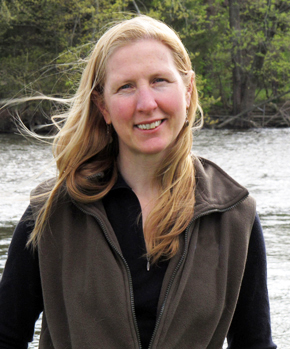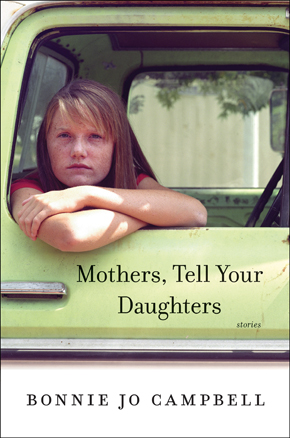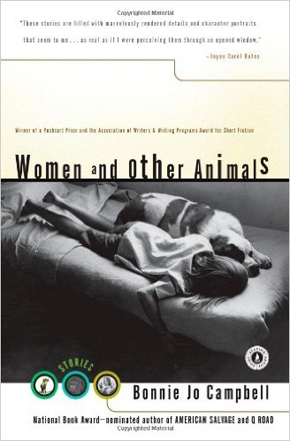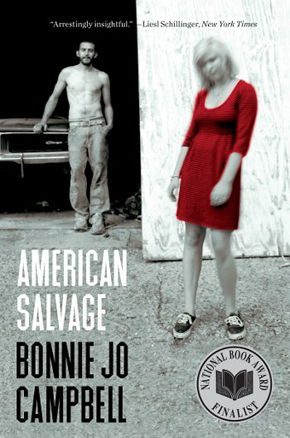Mothers, Daughters, Lovers, Misfits:
An Interview with Bonnie Jo Campbell
by Karin Cecile Davidson
 Bonnie Jo Campbell knows her way into the art of rural noir, her literary gaze on the landscape of Michigan’s Lower Peninsula spare with salvage yards and celery fields. Her stories are rich with raw, resilient, and untamed characters, each one coming to terms with whatever life has thrown her way. From those fiercely drawn in “Women and Other Animals” to those desperate and daring in “American Salvage,” the brothers and sisters, mothers and fathers, meth addicts, mechanics, lovers, hunters, circus performers, and serious misfits inhabiting these collections will us to lean in and know their stories, for these tales are given with grit and truth and are as real as they are wild. “Mothers, Tell Your Daughters,” Campbell’s latest collection, pulls us into the worlds of women we all know, daughters and mothers who might live next door, who breathe delicate, terrible, stunning secrets into our ears. And because the language is so surprising and the stories’ directions spin in startling and beautiful directions, we cannot stop listening.
Bonnie Jo Campbell knows her way into the art of rural noir, her literary gaze on the landscape of Michigan’s Lower Peninsula spare with salvage yards and celery fields. Her stories are rich with raw, resilient, and untamed characters, each one coming to terms with whatever life has thrown her way. From those fiercely drawn in “Women and Other Animals” to those desperate and daring in “American Salvage,” the brothers and sisters, mothers and fathers, meth addicts, mechanics, lovers, hunters, circus performers, and serious misfits inhabiting these collections will us to lean in and know their stories, for these tales are given with grit and truth and are as real as they are wild. “Mothers, Tell Your Daughters,” Campbell’s latest collection, pulls us into the worlds of women we all know, daughters and mothers who might live next door, who breathe delicate, terrible, stunning secrets into our ears. And because the language is so surprising and the stories’ directions spin in startling and beautiful directions, we cannot stop listening.
Bestselling author of the novels “Once Upon a River” and “Q Road” and winner of the AWP Award for Short Fiction, a Pushcart Prize, and the Eudora Welty Prize, Campbell was named a Barnes and Noble Great New Writer and National Book Awards finalist. She teaches writing at Pacific University’s low-residency MFA Program and lives in Michigan, where most of her stories take place, with her husband, whom she calls “Darling Christopher,” and a pair of beloved donkeys, Jack and Don Quixote.
Bury me at the crossroads so my spirit can travel, so even in death I won’t be forced to rest or grow mossy. Every one of you children was born at the crossroads, because every woman giving birth becomes a crossroads. Like they say in the song, a crossroads is a place that’s neither here nor there.
–Bonnie Jo Campbell
 KARIN CECILE DAVIDSON: Daughters and mothers of Michigan’s Lower Peninsula and beyond take possession of the sixteen stories in “Mothers, Tell Your Daughters”—girls inside their defiant teenage years; women, single and overwhelmed by the responsibility of children, especially daughters; and women examining the edges between life and death, still anchored by all that’s come before and giving any kind of afterlife a defiant glance. In “Tell Yourself,” a mother’s worry escalates with ideas of “what ifs” over her daughter’s burgeoning sexuality and the harm that might come to her in terms of men, their back-and-forth dialogue remarkably spot on. And conversely, in the title story—declared “vintage Campbell” in The New York Times Book Review—a woman who is unable to speak after a stroke addresses her daughter Sis in silence, confessing to years of neglect, to having allowed her daughter to be violated, her interior monologue instilled with anger, exhaustion, regret, honesty, and realization: “I wasn’t an affectionate mother, that much is true.” Author Pam Houston says it best: “Oh it’s a dark, sticky, potent, relentless, and heartbreaking business between mothers and daughters, and Bonnie Jo Campbell likes it there. She likes telling the truth …”
KARIN CECILE DAVIDSON: Daughters and mothers of Michigan’s Lower Peninsula and beyond take possession of the sixteen stories in “Mothers, Tell Your Daughters”—girls inside their defiant teenage years; women, single and overwhelmed by the responsibility of children, especially daughters; and women examining the edges between life and death, still anchored by all that’s come before and giving any kind of afterlife a defiant glance. In “Tell Yourself,” a mother’s worry escalates with ideas of “what ifs” over her daughter’s burgeoning sexuality and the harm that might come to her in terms of men, their back-and-forth dialogue remarkably spot on. And conversely, in the title story—declared “vintage Campbell” in The New York Times Book Review—a woman who is unable to speak after a stroke addresses her daughter Sis in silence, confessing to years of neglect, to having allowed her daughter to be violated, her interior monologue instilled with anger, exhaustion, regret, honesty, and realization: “I wasn’t an affectionate mother, that much is true.” Author Pam Houston says it best: “Oh it’s a dark, sticky, potent, relentless, and heartbreaking business between mothers and daughters, and Bonnie Jo Campbell likes it there. She likes telling the truth …”
Bonnie, what can you tell us about the hard truths that come from these mothers and daughters, their keen instincts and the wrenching decisions they make, the survival modes they enter, the emotional places where they kick around?
BONNIE JO CAMPBELL: Gosh, thank you for saying such smart things about these stories and for taking an interest in my fictional women. Their desires and fears and complexities come from the lives I’ve observed around me, and so your comments make me think I translated those essences and anxieties into real characters. I probably told all the truth I had about these particular mothers and daughters, all the truth that was interesting, anyhow—though the title story and a few others were even longer before I cut them down to their muscle and bone. In writing of such troubled lives, I don’t mean to suggest that all mothers and daughters have rough relationships of this sort—after all, we writers tend to write about only the most difficult situations. But I suppose there is a lot of trouble surrounding even the best mother-daughter relationships because there is so much danger for young women that their mothers cannot prevent. Some, like the woman in the title story, remain willfully ignorant of the problems of girls coming of age, but even those who protect their girls with great vigilance know they are fighting a losing battle. This makes for a profound sense of anxiety. And then, as these mothers and daughters age, there is a great anxiety about sickness and death, and there is plenty for daughters to worry about in their mothers. I suppose there is no rest for anyone in my stories. Maybe I should put a warning on the book’s cover.
And say, meanwhile, in your mother’s henhouse, your respite from the world of humans—there’s this screwy little Silkie with white feathers on her five-toed feet and more feathers sticking up showgirl-style on her head, and she’s just decided to hunker down in a nest box and peck anybody who touches her.
–Bonnie Jo Campbell
DAVIDSON: In “Daughters of the Animal Kingdom,” the story from “Mothers, Tell Your Daughters” which appears in this issue of Newfound, the narrator Jill calls us into her life. Imagine this is your life, she suggests, and we follow every word: “Say you’re the middle-aged only child of an increasingly fragile mother” who recently discovered she has cancer, something she considers more an annoyance than a threat; say you’re the wife of a wayward professor husband who has clutches of undergrad girls at his side; say you’re the mother of four daughters, the youngest approaching her pregnancy with an exaggerated holistic mindset that worries you; and just say you’re a zoology adjunct reflecting on the world and your own weighted secret by thinking of them in terms of Silkie hens, brown-and-gold tree snails, black widows, and queen bees.
How did you find your way to Jill’s voice, one that is all at once startling and funny and full of depth? And tell us about the layering of relationships here, which are as striking and beautiful as they are complicated.
CAMPBELL: This story was a lot of fun to write. Jill is approaching middle age, still (technically) fertile, but ready to move into the role of an older woman, a grandmother, a crone. She has arrived at what is to me a particularly interesting crossroads, and she has to make a decision about how her life is going to go: backward toward the enticements of youth or forward into old age, which offers wisdom. Because Jill is a zoologist, she has points of reference all over the animal kingdom, especially about hermaphroditic snail sex. She naturally tries to make sense of her own life and her mother’s life as part of the natural world, and I hope it makes for some comedy as well as tragedy. From the time I started writing seriously, I’ve been exploring women-animal connections, and this is an extension of that project. This was one of the last stories I wrote for the collection, and I wrote it in only a few months as opposed to the years or decades that my other stories have required. I really felt a kinship with Jill and enjoyed her crankiness immensely, maybe because I was feeling a little cranky myself as a woman of a certain age with a certain feisty kind of mother.
DAVIDSON: Within the realm of mothers and daughters, there are the women on the cusp of motherhood. Three stories come to mind: “Children of Transylvania, 1983” in which ravenously hungry Joannah dances with a pregnant Romanian bride and later wishes that she too could give birth to wild children raised on wolves’ milk; “My Dog Roscoe” wherein Sarah, married and pregnant, believes “a stray dog” with “a faded red collar” and “no identification tags” is the reincarnation of her deceased fiancé Oscar; and “The Greatest Show on Earth, 1982: What There Was” in which Buckeye decides between Black Mike, the man she loves and his unborn baby, and circus life. The narrative drive in these stories pitches forward, circles around, constant, wild and reckless at times—Joannah’s cycling, dancing, and lovemaking; Sarah’s unwavering strand of belief that loops from dismay to happiness; Buckeye’s idealistic, sexually-charged view of life aboard “the long silver whip of the circus train … heating up in the Arizona sun,” until the train comes to a scheduled stop in Phoenix, the railroad tracks stretching out toward the future.
These women move back and forth between states of calm and those of obsession and passion, their stories addressing the choices we make as women, the exaggerated version being “motherhood or circus life?” These are the kinds of characters who take a reader’s breath away. Where in the world did you find them?
CAMPBELL: Oh, gosh, I’m glad you like these complicated women. I guess I feel like I’ve been all these women at various times: passionate and terrified, sensible and outrageous, and even very foolish. In a sense, they are all possible versions of myself, selves I might’ve been if I’d let myself go in one particular direction without taking stock of all the other possible directions. Like Buckeye in “The Greatest Show on Earth,” I traveled with the circus for a while, and I still can imagine a whole alternative life lived in the circus—part of me never left that life on the train with the showgirls and elephant trainers. When I led bicycle tours across Eastern Europe—another part of my youthful adventuring—I ended up in some wild situations, and maybe I always longed to have sex in a ditch in Romania as the character does in “Children of Transylvania.” And like Sarah in “My Dog Roscoe,” I married a very good and kind man, and sometimes (though not in any serious way), I’ve considered that choosing such a good life companion robbed me of all kinds of awful life-changing experiences I could’ve had in the meanwhile, experiences that could have provided another kind of education. Part of the fun of writing is in being some of the people you never let yourself be.
The tiger is the brightest toy in this toy circus, a butane tiger-torch, a brilliant carved bit of amber …
–Bonnie Jo Campbell
 DAVIDSON: The circus stories of “Women and Other Animals” and “Mothers, Tell Your Daughters” send us into a stifling boxcar on a speeding train, a three-ring arena where an escaped tiger paces toward the audience, and a bar where the most beautiful woman is not a circus showgirl and the Smallest Man in the World stands atop the jukebox. The sudden leap in these collections from a countryside littered with car parts and semi-castrated hogs to the illuminated world of the circus is perhaps not so vast. Behind both the barn and the velvet curtain are the harsh and complicated lives of those subjected to rape, unwanted babies, and addiction.
DAVIDSON: The circus stories of “Women and Other Animals” and “Mothers, Tell Your Daughters” send us into a stifling boxcar on a speeding train, a three-ring arena where an escaped tiger paces toward the audience, and a bar where the most beautiful woman is not a circus showgirl and the Smallest Man in the World stands atop the jukebox. The sudden leap in these collections from a countryside littered with car parts and semi-castrated hogs to the illuminated world of the circus is perhaps not so vast. Behind both the barn and the velvet curtain are the harsh and complicated lives of those subjected to rape, unwanted babies, and addiction.
Especially here, Stuart Dybek’s praise comes to mind: “Campbell’s stories are alive, rich with humor and unpredictable but ultimately credible turns, keenly observed, and told with a savvy narrative drive. One can feel in them the love on the part of the author for the strange, the grotesque, the eccentric; but these aspects are never treated in a way that makes the stories freakish.”
Inside your circus tents, glamour is missing rhinestones and caked with grit. No shine, no sentiment here. So tell us, including your own time working with the circus, what was the primary inspiration for these stories and the rough-and-ready lives therein? And would you share an untold story from your months traveling by circus train, perhaps something that happened in the pie car?
CAMPBELL: We Americans have a certain kind of romantic idea about the circus, and we writers would be wise to choose as our topics, wherever possible, situations inherently interesting to readers. Also, it is a fun subversion to concentrate not on the parts of the circus readers find automatically glamorous but instead to focus on those low-paid physical laborers who support and underpin the whole enterprise. I’ve always thought reality with its blood and drool and nervous laughter, its missing buttons and gritty texture is far more romantic than any plastic-coated version of life. Those who choose to see the glamour over the sweat are keeping themselves at a distance from reality. I want to be so close to the humanity of the situation that I see the hand-sewn repairs in the fishnet stockings and the chapped lips of the snow-cone sellers. So when I joined the circus, I was rewarded with riches immediately by focusing on the lower economic status folks.
Gosh, a story that takes place in the pie car? Part of the problem I have with telling real life stories is that I don’t remember what really happened—all that has gone on has already passed through my fiction-writer brain. Okay, once during a dinner rush—meatloaf was the daily special, served with mashed potatoes and overcooked green beans—I saw the smallest man in the world, whose name was Mishu, stumble into the pie car with whiskey on his breath. There were two showgirls in bathrobes and high heels sitting at a small table in the center of the dining area. One was blond and the other was nearly bald because she had taken off the wig she performed in, but I remember she had a long neck with a mole on her clavicle. Mishu climbed up the bald showgirl’s lap and bared her breast by pulling aside her robe, and he suckled there. Okay, I’m lying. I made that up.
DAVIDSON: I’m laughing out loud! And yet and still, yes, here come the serious and sober questions on structure and style.
She was born more beautiful than the rest of us and called out more loudly from her crib, cried in her bed, and outside in the woods she wailed—she never said what those boys did to her beside the creek.
–Bonnie Jo Campbell
DAVIDSON: A structural decision in this collection was to splice longer stories with three striking slivers of flash, each one experimental in its own breathtaking way, no more than a page or two in length. Each one is a breath, a meditation, as weighted as the longer surrounding pieces. “My Sister Is in Pain” begins with an exhalation, a long and winding line that exposes an unbearable quiet suffering. “Sleepover” begins the collection, barely a page and touched with teenage longing. Marriage is the subject of “My Bliss,” multiple marriages—to cereal boxes and cigarettes, squirrels and “a slim-hipped quiet confidence leaned against the wall of the Lamplighter Lounge”—all fleeting, never lasting.
There is stylistic fun in these stories, and also a serious, unsentimental look at women’s lives. What sent you in these experimental directions, and how did you decide to include the trio in a collection of predominantly traditional-length short stories?
CAMPBELL: When I took a look at the more difficult stories in this collection, I knew it was going to be important to get the sequence just right in order to keep the energy flowing for the reader. In fact, at the last minute I had to change the order of the collection because I’d placed a story with a heart-wrenching ending (“The Greatest Show on Earth”) directly before a silly-sounding story (“Blood Work.”) It almost seemed that the comical view of suffering in “Blood Work” belittled the very real suffering of the characters in the previous story. So I made a switcheroo. And I was thrilled that my editor at W.W. Norton, Jill Bialosky, allowed me to insert a few of the short shorts to cleanse the palate between some of the longer stories. I really enjoy writing these very short stories, the way they demand intense focus on language. The short-short that starts the book, “Sleep Over,” is a true, traditional story in miniature, but the other two “My Sister Is In Pain” and “My Bliss” are experiments in exuberant language, as much prose poems as stories. I’m pretty happy with how the order ended up, but it took time to get it right, a lot of shuffling and considering and reconsidering. So much goes into making any story collection, with all those moving parts!
I’ve got a head full of stories you still need to hear, starting with my ribs, ending with my whole life.
–Bonnie Jo Campbell
 DAVIDSON: The stories of “Mothers, Tell Your Daughters,” “American Salvage,” and “Women and Other Animals” call up the songs of Gillian Welch, a singer-songwriter who lays her voice at the feet of the working class with strains of understanding and honesty, but not a thread of pity. The women and men of your stories possess the same fiber of strength heard in Welch’s voice, the reality that life may be troubled and hard, but there’s still a way through.
DAVIDSON: The stories of “Mothers, Tell Your Daughters,” “American Salvage,” and “Women and Other Animals” call up the songs of Gillian Welch, a singer-songwriter who lays her voice at the feet of the working class with strains of understanding and honesty, but not a thread of pity. The women and men of your stories possess the same fiber of strength heard in Welch’s voice, the reality that life may be troubled and hard, but there’s still a way through.
Your focus is on the working class—the battered and brave toiling for less than a living wage, sometimes giving in to substance abuse or rising up with shotgun or shovel in hand to find a way to survive. Tell us about this focus, the incentive and reasoning which led you to the places and the people that continue to inform and deepen your writing.
CAMPBELL: Maybe I’m interested in the working poor because that’s where I come from, that’s my community in my part of Michigan, but I like to think that those who struggle and whose success is not guaranteed are in some more profound way the perfect subjects for stories and art of all kinds. Writers like me are interested in trouble, and poor folks have the kind of day-to-day, moment-to-moment struggles I’m most interested in. Poor folks have to shout to be heard in our society, and I hope I can be a part of that shouting. Surely the rich folks have troubles too—it’s not easy to be anybody—but other writers are better at presenting their problems in art.
I’m thrilled that you mention Gillian Welch in respect to my writing. She is my favorite musician, gathering energy from plain people who have plain problems. On the blog Largehearted Boy in the Book Notes series, I arranged a playlist of songs that inspired me in writing the stories of “Mothers, Tell Your Daughters.” I listed Welch’s “Caleb Meyer” as important to me, a song about a young woman who kills her rapist—that feels like a story I’d write.
I’m thinking about alchemy right now, without in any way being an expert about the old art. As I understand it, the most fundamental thing is that we start by filling our vessels (which is to say our hearts and minds) with the plain material of life, material that does not immediately appear to be precious, and this is the special stuff that can be acted upon and turned to gold.

Karin C. Davidson, Interviews Editor
